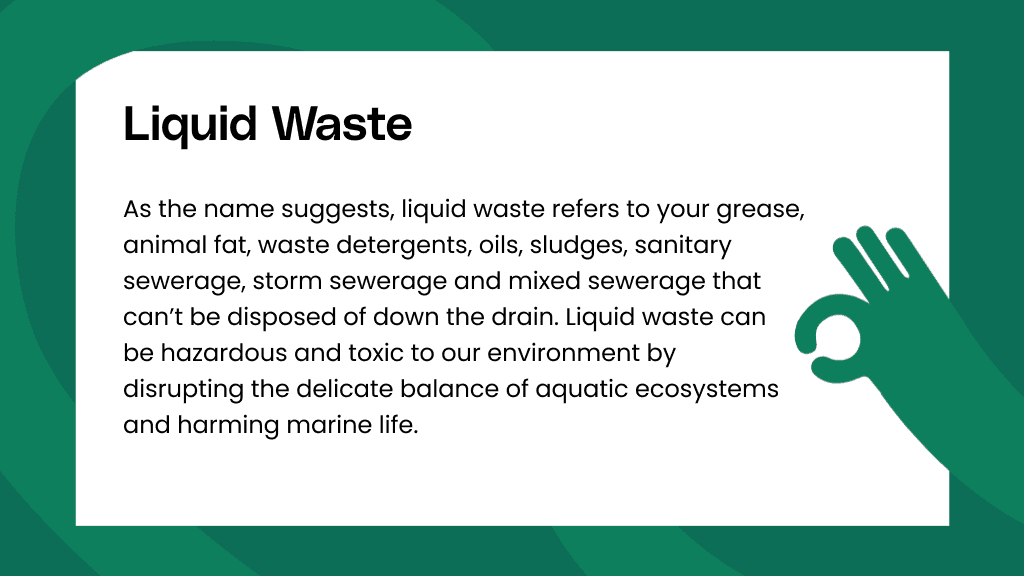Some Known Details About Reclaim Waste
Some Known Details About Reclaim Waste
Blog Article
Some Known Factual Statements About Reclaim Waste
Table of ContentsHow Reclaim Waste can Save You Time, Stress, and Money.Our Reclaim Waste PDFsThe Reclaim Waste PDFsThe Best Strategy To Use For Reclaim WasteNot known Incorrect Statements About Reclaim Waste
Explore the kinds, occurrences, and types of fluid waste. Domestic sewer waste describes the waste and items from a property septic system. This kind of waste is developed by human beings in residences, schools, and other structures. This only consists of septic containers that have a drain field. The correct monitoring and disposal of domestic sewage waste require liquid waste to be moved to a sewage therapy plant where the proper approaches and tools are related to detoxify and deal with waste.
Industrial waste typically includes possible hazards, such as combustible materials or a blend of fluid and strong waste products, and requires an advanced and in-depth disposal procedure. The disposal of commercial waste normally involves the filtering of waste before transportation to make sure safe and correct disposal. Industrial waste is produced from results and drainage of industrial processes and manufacturing.
This type of waste can not use the exact same sewer monitoring transport or processes as septic or commercial liquids. The hazardous waste administration procedure requires the evaluation and screening of liquid waste before it undergoes the disposal procedure (liquid waste disposal melbourne). Drainage waste is the fluid waste that originates from drainage and excess stormwater in very booming locations or cities
Runoff waste can create contamination and flooding if not handled correctly. Find out more about drain cleaning and waste administration. Making sure correct waste management can protect against catastrophes and reduce ecological damage. Both individuals in residential settings and professionals in business or production industries can benefit from comprehending the processes and regulations of liquid waste monitoring.
Reclaim Waste Things To Know Before You Get This
Contact PROS Providers today to learn about our waste administration and disposal solutions and the proper methods to take care of the fluid waste you create.
(https://hearthis.at/leon-aube/set/reclaim-waste/)Do you understand what takes place to your water when you draw the plug, purge the toilet or drain the cleaning device? No? Well, it deserves understanding. This supposed 'wastewater' is not only a crucial resource however, after therapy, will certainly be released to our land, waterways or the sea. Utilized water from toilets, showers, baths, kitchen sinks, laundries and industrial procedures is known as wastewater.

water utilized to cool down equipment or tidy plant and tools). Stormwater, a form of wastewater, is overflow that moves from agricultural and metropolitan locations such as roof coverings, parks, yards, roadways, paths and gutters into stormwater drains, after rain. Stormwater moves untreated directly to neighborhood creeks or rivers, at some point getting to the sea.
Little Known Questions About Reclaim Waste.
In Queensland, a lot of wastewater is treated at sewage treatment plants. Wastewater is moved from domestic or industrial sites via a system of drains and pump terminals, referred to as sewerage reticulation, to a sewer therapy plant. City governments build, preserve and run most sewer therapy plants. Operators are accredited under the Environmental Defense Act 1994 to discharge cured wastewater at an acceptable environmental standard right into waterways.
The Department of Natural Resources advises city governments regarding managing, operating and preserving sewage systems and therapy plants. In unsewered areas, city governments might require owners to set up individual or household sewage treatment systems to deal with residential wastewater from toilets, cooking areas, restrooms and laundries. The Department of Natural Resources authorises the usage of family systems when they are verified to be reliable.
The majority of stormwater obtains no therapy. In some new communities, treatment of some stormwater to get rid of trash, sand and crushed rock has actually begun making use of gross toxin catches. Wastewater treatment takes place in four phases: Removes strong issue. Bigger solids, such as go to website plastics and various other things wrongly released to sewers, are gotten rid of when wastewater is gone through screens.
Wastewater then moves into big tanks where solids settle and are gotten rid of as sludge. Oil and scum are skimmed from the surface area. Uses small living organisms called micro-organisms to damage down and get rid of continuing to be liquified wastes and great particles. Micro-organisms and wastes are incorporated in the sludge. Removes nitrogen and phosphorus nutrients that could cause algal blooms in our rivers and intimidate marine life.
The 8-Minute Rule for Reclaim Waste
Nutrient removal is not readily available at all sewer therapy plants since it requires pricey specialist equipment. Clear fluid effluent created after therapy may still include disease-causing micro-organisms - industrial wastewater treatment.

This usually implies wastewater has to be treated or impurities eliminated prior to it can be released to waterways. The majority of wastewater flows into the sewerage system. Under the Act, local governments administer authorizations and permits for ecologically relevant tasks (ERAs) including wastewater launches that may have a neighborhood effect. The department administers approvals and permits to Ages including wastewater launches that might have a local or statewide influence.
The Buzz on Reclaim Waste
Or else, samples are taken for research laboratory evaluation. Usually numerous examinations are required to develop the degrees of each of the different pollutants such as oils, hefty steels and pesticides in water. Tracking provides factual details concerning water top quality and can validate that licence problems are being met. The information acquired through surveillance supplies the basis for making water top quality choices.
Report this page